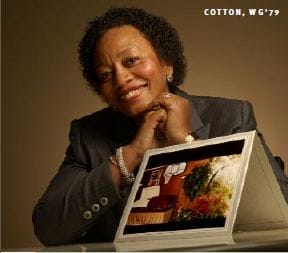Slivy Edmonds Cotton’s paternal grandmother seemed always to be over a stove or at a cutting board. “Big Mama,” as everyone called her, was never unhappy about that and died a happy woman, with everyone in the family remembering fondly the kitchen she dominated.
Now, if Cotton’s favorite current kitchen is any barometer of the times, lots of other grandmothers were Big Mamas in their own rights. Cotton, a member of Wharton’s Graduate Executive Board and the Chair and Chief Executive Officer of Perpetua, Inc., a funeral home operations company, is a pioneer in progressive, interactive funerals. At the most recent convention of the National Funeral Directors and Morticians Association in Atlantic City, Perpetua showed off its Big Mama’s Kitchen funeral set. It had a linoleum floor, a stove, cabinets, a spice rack, and a table and chairs.
Oh, yes, and a frilly, painted white casket with a fluffy pillow and “Big Mama’s” favorite accessories.
“We started looking at Baby Boomer research,” said Cotton from Perpetua’s offices in Tucson, Arizona. “This has been a generation that has changed every industry, and we found that funeral service was not going to be an exception. We looked at what people did and didn’t like about the process. What we found is that the funeral business, like all successful businesses today, will have to create experiences. So that is what we set out to do.”
Cotton said that while she was wary at first about how the media would treat the idea of creating sets like Big Mama’s Kitchen for funerals, it has generally been a positive experience.
“We’ve been everywhere, from classic rock radio stations to CBS to National Public Radio to papers in Australia and Spain,” she said. “We’re not used to having positive stories about the funeral industry, but we’ve been really pleased about the way this has all turned out.”
No one should be surprised at the way things turn out positively for Cotton, for her life has been marked by an ability to glide past seeming roadblocks with energy and style.
Cotton grew up for the most part in Norfolk, Virginia, before her family moved to Philadelphia while she was in high school. She graduated from Dobbins, one of the city’s technical high schools, and decided to get a nursing degree.
“It was either that or be a math teacher, and it seemed that the road to nursing was going to be faster. I was set on being a registered nurse for the next 50 years,” she said.
But then three years into that proposed 50, Cotton had a change of heart. She was offered a head nursing position and tensed up a bit.
“Suddenly, that seemed like the top rung, nowhere to go for 40 years,” she said. “I decided that before I took that step, I wanted to see the world a bit.”
So she signed on with TWA and started flying with them, first as an attendant and then managing in the company’s New York offices.
“One day on a plane, I met a gentleman who went to Wharton,” said Cotton. “I told him I had thought about going into business and had somewhat of a math background. He told me to talk to the people at Wharton to see what to do next. I did it, and it was never a mistake.”
While working at various jobs in the TWA corporate offices, Cotton slowly got an undergraduate business degree at Marymount Manhattan College and then got her Wharton MBA. She was recruited into Bristol Myers’ first internal management development program, but after a couple of years, decided that the stability was not, ironically, for her.
“I had been with a company, TWA, in the midst of labor strikes and deregulation and the chaos of losing lots of money. Bristol Myers had a lot of resources, but I found I missed the challenge of working on problems of companies going through turmoil and change,” she said. So she went to work in the mergers and acquisitions and venture capital departments at Equitable Capital.
Through that job, she met several people who wanted to start their own venture capital firm and signed on with them. She consulted for companies in the partners’ portfolio, eventually becoming the CFO of one of them, Envirotest Systems Corp., an auto emissions testing company headquartered in Tucson. She moved from her beloved East Coast to the dry, hot West for a couple of years, eventually seeing the company through to its public offering, then semi-retiring.
“By that time I had gotten married to a great guy, so I was stuck here,” she said with a laugh. Her husband, Lorenzo Cotton, is an architect with Pima Community College, the fourth largest community college in the country, with a million square feet of facilities and, thus, a whole lot of work for an architect. She started working with the arts and various charities in the Tucson area, not worrying about getting back into the corporate world.
Then one day while she was at a spa weekend, she got a call from one of her investors from her venture capital days.
“They told me I was bored and needed to look at this funeral company they were thinking of investing in,” she said. “I tell them now they took advantage of me because I was delirious from that 800-calorie-a-day spa diet. Funeral homes were not a business I had ever thought of.”
Like many, Cotton had negative views of funeral-home operators for much of her life, figuring they were just cynical folks trying to gouge the bereaved. But her father died during the time of the Envirotest public offering.
“This was a doubly stressful time and surprisingly, I found the negative reports about funeral directors not to be the case, at least in my situation. They were extremely good to me,” she said. “So when they called and asked if I would look at the company, I said OK.”
It turned out that Perpetua’s founders were casket sales people, and while they were good at that business, they weren’t so adept at either funeral service or acquiring other funeral homes, which is what they had planned to do. The company was headquartered in Jacksonville, Florida, but had no properties there. Their business was spread out in the Northeast and Midwest.
Cotton moved the headquarters to Tucson and decided that the idea of merely buying ongoing funeral homes was not the way to go. She decided to use the most successful of the properties that Perpetua had, the Wade Funeral Home in St. Louis, a long-time, family-run business, as an experimental laboratory of sorts. She said that Batesville Casket Company, the largest purveyor of caskets in the country, was already suggesting to its customers that funeral services had to be updated.
“I had been to a business conference and was impressed with a talk about what was called the ‘experience economy’, and the combination of that and Batesville’s encouragement led us to the idea of celebrating a person’s life, rather than bemoaning their death, in a funeral service,” she said.
In the beginning, things were a little unwieldy. The first ‘experiential’ funeral Perpetua did at Wade Funeral Home was for a schoolteacher. They brought in a blackboard and one of her favorite chairs, putting her shawl around the chair. Then there was a basket of apples by her desk, so that everyone could take an apple from the teacher whom they had brought apples to in her teaching days.
“People responded to it. Her former students loved it. So we tried it again,” she said.
The next one was for an avid movie-goer, so they had popcorn popping and his favorite movies playing on a video screen at the wake. The next try was for a fisherman, so there was a set with a dock and fishing poles and people came to sit around and tell stories about his favorite avocation.
“Soon people would come from the traditional funeral room and look at these and say, ‘Hey, how come we didn’t get that?’” she said.
Now Wade offers three standard sets: the traditional funeral; a sports-oriented set with a Barcalounger and a TV tuned low to Super Bowl or basketball footage; and Big Mama’s Kitchen.
Capitalizing on the Baby Boom experiential mentality that she believes she has captured and the attendant publicity, Cotton now hopes expand Perpetua’s reach. Rather than acquire existing funeral homes, as the former management had planned, Cotton thinks the way to go is to build new Perpetua-branded homes in underserved areas.
“Good funeral homes tend to have those community and family connections, so it would not pay for us to try to compete with them,” she said. “But there are plenty of places where there are no good facilities. That is where we intend to go and give these updated, modern services.”
Cotton said she plans to staff the new homes with people instructed in a Perpetua training center in Tucson. She said it is not morbid for her to be bullish on the funeral industry.
“Yes, I got HBO this year because people kept referring to episodes of ‘Six Feet Under’,” she said, talking about the cable TV drama about a family-run funeral home. “Families have come in [at Wade] and asked about certain things, and I realize they got it from an episode there.
“But it is a really good time to talk about family traditions and celebrating life, not getting mired in death,” she said. “It is important to understand today that there are options to somber services. Death is, to be sure, a part of life.”


























